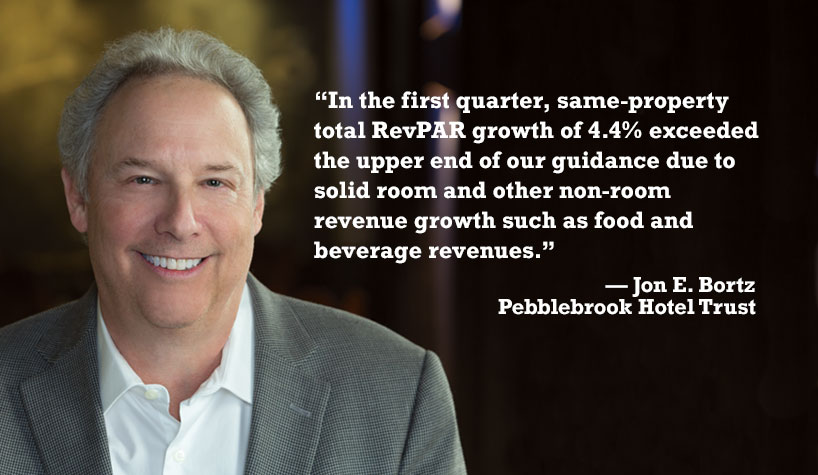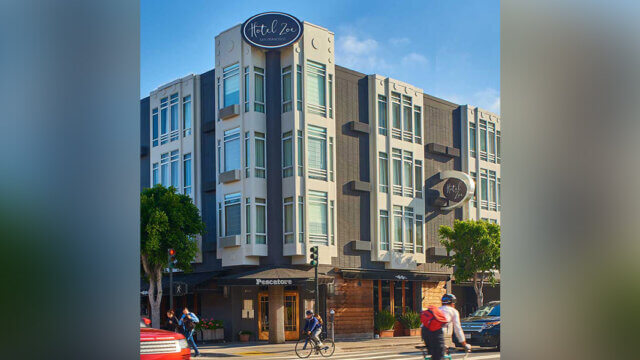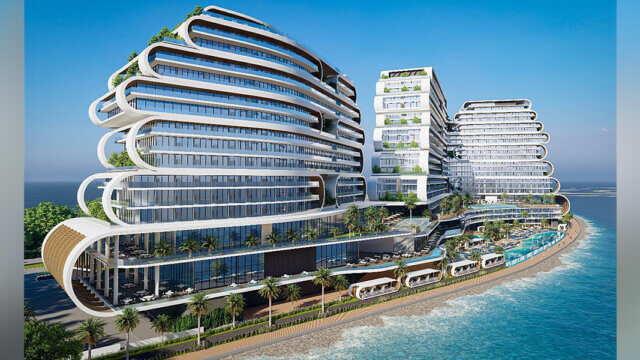BETHESDA, MD—Pebblebrook Hotel Trust revealed solid operating results for the first quarter of this year, beating Wall Street estimates.
“Same-property total RevPAR, adjusted EBITDAre and adjusted FFO per diluted share beat our outlook largely due to healthy RevPAR growth of 4.3%, strong growth of 4.4% in other revenues, including food and beverage revenues, and slightly better margins than forecasted,” said Jon E. Bortz, chairman, president and CEO of Pebblebrook Hotel Trust.
While March demand trends were weaker than expected for the hotel industry and Pebblebrook’s portfolio, Bortz sees a continuation of solid group and transient business and leisure travel demand as its group and transient pace advantages over 2018 remain favorable.
“Our 2019 outlook for the hotel industry and Pebblebrook remains positive, as the U.S. economy rolls on despite geopolitical uncertainty; employment and wages continue to increase, inflation remains low, and consumer and business confidence remain strong,” said Bortz.

Among the highlights:
Net Income: The company’s net income was $5.7 million in the first quarter of 2019, a decrease of $18.9 million as compared to the same period of 2018.
Same-Property Total RevPAR and Same-Property RevPAR: Same-property total RevPAR for the quarter grew 4.4% over the same period of 2018. Same-property RevPAR for the quarter increased 4.3% over the prior year to $187.76. Same-property ADR rose 5.3% from the prior year to $249, and same-property occupancy declined by 1% to 75.4%.
Same-Property EBITDA: The company’s hotels generated $100.1 million of same-property EBITDA for the quarter ended March 31, up 2.7% over the same period of 2018. Same-property revenues climbed 4.4%, while same-property expenses increased 5%. Excluding the mandatory California Proposition 13 increases in real estate taxes for the California properties acquired as part of the company’s corporate acquisition in November 2018, expenses increased approximately 4%. Same-property EBITDA margin for the quarter decreased 45 basis points to 27.6% as compared to the same period last year. Excluding the increase in real estate taxes due to California’s Proposition 13, same-property EBITDA margin would have increased 24 basis points. Adjusted EBITDAre: The company’s adjusted EBITDAre increased 52.7%, or $31.2 million, to $90.5 million from $59.3 million in the prior year period.
Adjusted FFO: The company’s adjusted FFO grew 31.3% to $60.7 million from $46.2 million in the prior year period, which was impacted by the seasonal operating weakness of the first quarter and the non-seasonal increase in interest expense as a result of the company’s corporate acquisition in November 2018. The company’s adjusted FFO per diluted share declined 31.3% to $0.46 compared to the prior year period. The decline in adjusted FFO per diluted share is due to the increase in diluted share count as a result of the company’s corporate acquisition in November 2018.
Dividends: On March 15, the company declared a regular quarterly cash dividend of $0.38 per share on its common shares as well as a regular quarterly cash dividend for the following preferred shares of beneficial interest:
- $0.40625 per 6.50% Series C Cumulative Redeemable Preferred Share
- $0.39844 per 6.375% Series D Cumulative Redeemable Preferred Share
- $0.39844 per 6.375% Series E Cumulative Redeemable Preferred Share
- $0.39375 per 6.30% Series F Cumulative Redeemable Preferred Share
“In the first quarter, same-property total RevPAR growth of 4.4% exceeded the upper end of our guidance due to solid room and other non-room revenue growth such as food and beverage revenues,” said Bortz. “In addition to the incredibly strong RevPAR growth of 23.7% at our 12 hotels in San Francisco, we also achieved healthy RevPAR growth at our properties in South Florida; Buckhead, GA; and Boston. As anticipated, weakness in Chicago; Portland, OR; Washington, DC; and Los Angeles offset some of this strength. Hotel expense growth was slightly lower than we anticipated, which allowed better than forecasted revenues to flow to the bottom line of the portfolio. We’re also excited about the significant opportunities with increased economies of scale due to our larger portfolio, which we expect will lead to reduced hotel operating expenses and improved profitability throughout the entire portfolio. We anticipate successfully achieving these improvements throughout 2019 and 2020.”




